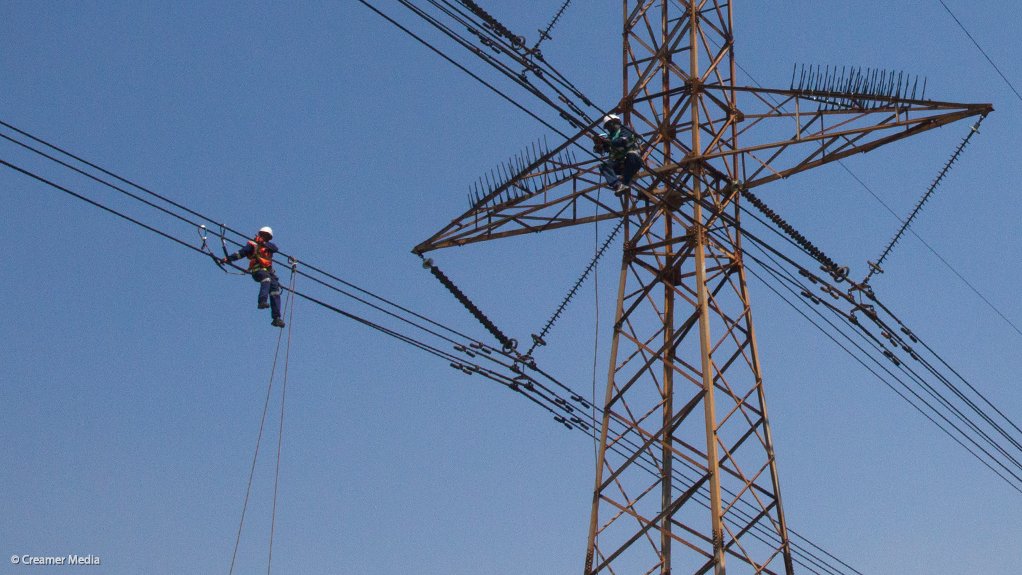Industry calls for minimum local-content specifications in private grid projects
Following consultations with the Department of Energy and Electricity (DEE) on an initiative to procure new grid infrastructure from private consortiums, local Industry has again urged government to specify minimum percentages of locally sourced products and services for the upcoming procurement of Independent Transmission Projects (ITPs).
In a joint statement, the Steel and Engineering Industries Federation of Southern Africa, the Power Line Association of South Africa and the Manufacturing Circle highlighted that the country’s existing transmission infrastructure had been delivered by local contractors and manufacturers, and that this capability remained largely intact.
They argued that the ITP programme represented “a once-in-a-generation opportunity to strengthen local industrial capacity, create jobs, and position South Africa as a competitive player in the global transmission supply chain”.
Ahead of the meeting, which took place on October 31, the associations wrote to the Independent Power Producer Office, which is overseeing the initial procurement of 1 164 km of powerlines and 2 630 MVA of transformation capacity across seven corridors, expressing their anxiety that local industry was being sidelined.
Particular concern was raised about the criteria outlined in the request for qualification (RFQ) documentation, which the organisations argued was onerous and not enabling of participation by local industry.
During the consultation, Electricity and Energy Minister Dr Kgosientsho Ramokgopa indicated that it would seek to address some of the issues raised before the release of the request for proposals (RFP), and even indicated that government was willing to pay a premium for local content.
The Minister also said that those issues not fully addressed would be “remedied” in future ITP bidding rounds, but that efforts would be made to create space in the first round for both local content and for local engineering, procurement and construction contractors.
However, it was also announced that the RFP had been delayed until the third quarter of 2026 from an initial proposed release date of before the end of 2025. This, largely to align the procurement timetable with the launch of the Credit Guarantee Vehicle, which was being set up to ensure that the ITP programme could proceed in the absence of government guarantees.
A total of 17 consortiums had responded to the RFQ, and a draft RFP would be issued by December 15 to those consortiums selected to participate in the bidding process once the final RFP was released in 2026.
Besides urging government to stipulate local content in line with designations set by the Department of Trade, Industry and Competition and National Treasury, the three entities also recommended that the majority South African equity participants in the consortiums had proven technical expertise, and that there be a mandatory inclusion of South African contractors and/or manufacturers.
They also proposed a sectoral industrialisation commitment to ensure that, where possible, all steelwork and hardware components were locally manufactured.
Certainty of demand was also underlined as a key requirement for facilitating industrialisation spin-offs from the ITP, which is a component of the National Transmission Company South Africa’s (NTCSA’s) larger Transmission Development Plan (TDP).
The TDP, which will not be updated for the next two years to allow the NTCSA to align it to the newly released Integrated Resource Plan 2025, envisaged the roll-out of 14 500 km of new powerlines and 133 000 MVA of additional transformers by 2034 at an estimated cost of above R400-billion.
“If industry knows what volumes will be procured locally, it can confidently invest in expanding manufacturing capacity — and that investment will translate directly into jobs and industrial growth,” the three organisations said, while also arguing that the ITP could become a launchpad for export-led growth in engineering and manufacturing.
“Through coordinated industrial policy, strategic procurement, and inclusive participation, the ITP can serve as a catalyst for long-term industrial expansion, job creation, and regional competitiveness,” they added.
Article Enquiry
Email Article
Save Article
Feedback
To advertise email advertising@creamermedia.co.za or click here
Announcements
What's On
Subscribe to improve your user experience...
Option 1 (equivalent of R125 a month):
Receive a weekly copy of Creamer Media's Engineering News & Mining Weekly magazine
(print copy for those in South Africa and e-magazine for those outside of South Africa)
Receive daily email newsletters
Access to full search results
Access archive of magazine back copies
Access to Projects in Progress
Access to ONE Research Report of your choice in PDF format
Option 2 (equivalent of R375 a month):
All benefits from Option 1
PLUS
Access to Creamer Media's Research Channel Africa for ALL Research Reports, in PDF format, on various industrial and mining sectors
including Electricity; Water; Energy Transition; Hydrogen; Roads, Rail and Ports; Coal; Gold; Platinum; Battery Metals; etc.
Already a subscriber?
Forgotten your password?
Receive weekly copy of Creamer Media's Engineering News & Mining Weekly magazine (print copy for those in South Africa and e-magazine for those outside of South Africa)
➕
Recieve daily email newsletters
➕
Access to full search results
➕
Access archive of magazine back copies
➕
Access to Projects in Progress
➕
Access to ONE Research Report of your choice in PDF format
RESEARCH CHANNEL AFRICA
R4500 (equivalent of R375 a month)
SUBSCRIBEAll benefits from Option 1
➕
Access to Creamer Media's Research Channel Africa for ALL Research Reports on various industrial and mining sectors, in PDF format, including on:
Electricity
➕
Water
➕
Energy Transition
➕
Hydrogen
➕
Roads, Rail and Ports
➕
Coal
➕
Gold
➕
Platinum
➕
Battery Metals
➕
etc.
Receive all benefits from Option 1 or Option 2 delivered to numerous people at your company
➕
Multiple User names and Passwords for simultaneous log-ins
➕
Intranet integration access to all in your organisation





















